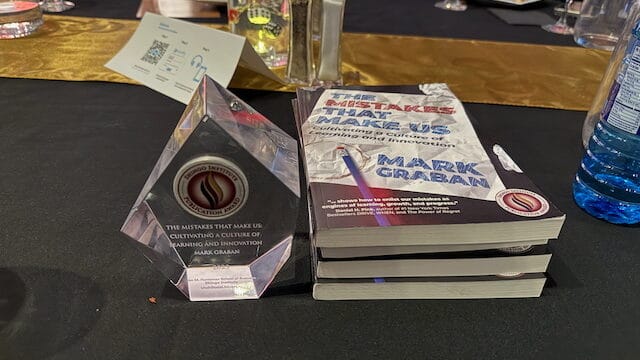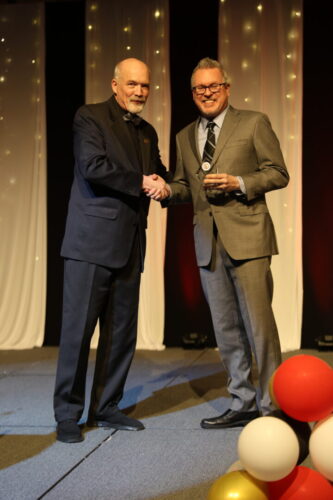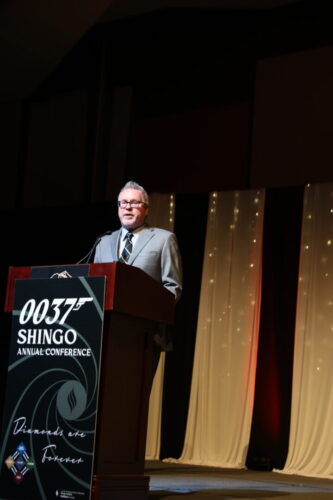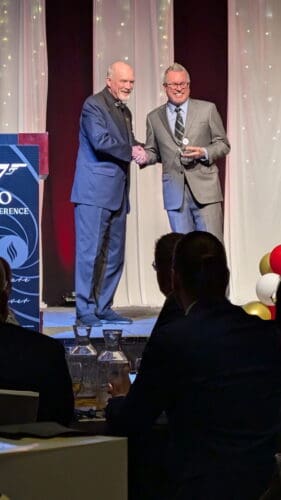Today's post is a longer and annotated version of my acceptance speech at last week's Shingo Conference awards gala.
It's a great honor that The Mistakes That Make Us has received the 2025 Shingo Publication Award. I'd like to use this post to reflect–not just on the award itself, but on the journey behind the book, the mentors and ideas that inspired it, and what it means to keep learning from mistakes.

Remembering Those Who Led by Example
Before I talk about the book, I want to remember three people who shaped my thinking and whose influence is hopefully apparent in the book: Norman Bodek, Ritsuo Shingo, and Stephen Covey. While they're no longer with us, their spirit is very much alive in this work.
Norman taught me (and many others) that kaizen, or continuous improvement, is something all people can participate in. Ritsuo Shingo, son of Dr. Shigeo Shingo, carried his father's torch–not just around Lean tools like mistake-proofing, but in the deeper mindset of “respect for people.” And Stephen Covey's writing challenged me to consider character and integrity as the foundation for effective leadership. I hope this book honors what they stood for.
Why Write a Book About Mistakes?
Because we all make them.
The difference is how we respond to them. Do we hide them–or do we reflect, learn, and improve?
There's a quote attributed to Dr. Shingo that I've come to appreciate deeply:
“Mistakes are inevitable, but the defects that arise from them are not.”
Bruce Hamilton has cited this, and it captures the essence of his thinking–and of mine. Mistakes happen. What matters is what we do next.
Typos and Andon Cords
Writing a book about mistakes is, in itself, a bit ironic. It invites readers–many kindly and constructively–to pull the proverbial andon cord when they spot typos or glitches. And sure enough, despite the work of a professional copy editor and proofreader, a few slipped through.
This happens with just about every book. It's a reminder that you can't inspect quality into a product–you have to build it in. And even then, perfection is elusive.
Case in point: There were typos on page one of the first edition of The Toyota Way and even my own Lean Hospitals (also on the first page). But those mistakes get corrected, just as they should, over time. And if you see one in The Mistakes That Make Us–please let me know. I appreciate the feedback. It helps us all improve.
Gratitude for the Team
I'd like to thanks others who have helped me in this journey.
Thank you to Jeff Liker, a past Shingo Award recipient, for the nomination and for his generous support. My developmental editor Tom Ehrenfeld (earning his 11th Shingo with this!) helped bring structure, clarity, and heart to the book. And thank you to my longtime friend and cover designer, Don Coon, who's been a creative force in my life since elementary school. He's the one who gifted me the word “cultivating” for the subtitle–an idea that blossomed into a major metaphor for the book.

Dr. Shingo's True Legacy
Many people associate Dr. Shingo with mistake-proofing (or poka yoke). But his deeper legacy might be how he changed his thinking.
Early in his career, he used the phrase “fool-proofing” (baka yoke). But he realized that language wasn't respectful. He evolved. He taught us that it's not about blaming people–it's about designing better systems. That insight is essential: Mistake-proofing is about setting people up for success, not labeling them as failures.
He modeled what we now call a growth mindset. He demonstrated humility. That's leadership.


The Spirit of the Podcast–and the Book
Many of the stories in the book came from the My Favorite Mistake podcast. Guests like Ken Segel, Billy Taylor, and Ken Snyder–who were present at the awards ceremony–shared mistakes not as scars, but as stepping stones. Their openness created space for learning. That's what psychological safety looks like in action.
If we want organizations that learn, we need to normalize the conversation around mistakes. That doesn't mean accepting preventable harm–it means creating systems where people feel safe to speak up, reflect, and improve.
Other Recipients
I'd also like to acknowledge and thank the other two recipients of the publication award.
Dennis R. Delisle, from The Ohio State University, was honored for his book Lean Healthcare, Second Edition.
Unable to be there was my friend Sylvain Landry, from HEC Montreal. His book is titled Bringing Scientific Thinking to Life. He appeared via a pre-recorded video:

The Road Ahead
The Shingo Award is an honor that I'm thrilled to receive. But it's not the end of the journey. It's a moment to recommit.
Let's keep building workplaces where mistakes aren't feared or buried. Let's create environments where vulnerability is rewarded, not punished. Let's turn errors into insights and missteps into momentum.
Because truly, it is the mistakes that make us.
Thank you for reading–and thank you to everyone who's part of this journey.
Please scroll down (or click) to post a comment. Connect with me on LinkedIn.
Let’s build a culture of continuous improvement and psychological safety—together. If you're a leader aiming for lasting change (not just more projects), I help organizations:
- Engage people at all levels in sustainable improvement
- Shift from fear of mistakes to learning from them
- Apply Lean thinking in practical, people-centered ways
Interested in coaching or a keynote talk? Let’s talk.
Join me for a Lean Healthcare Accelerator Trip to Japan! Learn More










